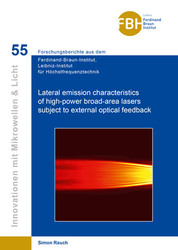| Departments | |
|---|---|
| Book Series (97) |
1381
|
| Nachhaltigkeit |
3
|
| Gesundheitswesen |
1
|
| Humanities |
2369
|
| Natural Sciences |
5408
|
| Mathematics | 229 |
| Informatics | 319 |
| Physics | 980 |
| Chemistry | 1364 |
| Geosciences | 131 |
| Human medicine | 243 |
| Stomatology | 10 |
| Veterinary medicine | 108 |
| Pharmacy | 147 |
| Biology | 835 |
| Biochemistry, molecular biology, gene technology | 121 |
| Biophysics | 25 |
| Domestic and nutritional science | 45 |
| Agricultural science | 1005 |
| Forest science | 201 |
| Horticultural science | 20 |
| Environmental research, ecology and landscape conservation | 148 |
| Engineering |
1795
|
| Common |
98
|
|
Leitlinien Unfallchirurgie
5. Auflage bestellen |
|
Advanced Search
Lateral emission characteristics of high-power broad-area lasers subject to external optical feedback (Volume 55) (English shop)
Simon Rauch (Author)Preview
Table of Contents, PDF (510 KB)
Extract, PDF (700 KB)
The beam quality and lifetime of gain-guided broad-area laser diodes degrades with increasing optical output power: The near field is progressively narrowed by thermo-optic effects, leading to an enhanced optical facet load and an over-proportionate far-field blooming.
Common single-side emitting broad-area lasers are extremely asymmetric devices with respect to the longitudinal direction. The high semiconductor gain along with a high single-side output coupling leads to a strong asymmetry of the electric fields. Hence the internal optical power and thus the thermal load are highest in the vicinity of the out-coupling facet. Moreover, external optical feedback intensifies the optical and thermal load at the emission facet of the diode laser.
In this thesis, the impact of the longitudinal distribution of internal intensity, temperature and gain on the lateral beam parameters is revealed. Numerical simulations demonstrate that homogenizing the longitudinal device temperature prevents near-field narrowing and accompanying far-field blooming, which is experimentally verified by symmetrizing the facet reflectivities.
The second part of this work deals with the impact of spatially mismatched optical feedback on beam quality and lifetime. It is found that irradiance of solder and p-side metalization as well as the adjacent highly p-doped layers causes localized heating around the front facet, which strongly reduces the threshold for catastrophic optical damage. It was also found that lateral displacement of the feedback spot can lead to severe beam quality degradation for single-side emitting devices. This effect could be reduced by symmetrically out-coupling external-cavity configurations.
| ISBN-13 (Hard Copy) | 9783736971585 |
| ISBN-13 (eBook) | 9783736961586 |
| Final Book Format | A5 |
| Language | English |
| Page Number | 112 |
| Edition | 1. |
| Book Series | Innovationen mit Mikrowellen und Licht. Forschungsberichte aus dem Ferdinand-Braun-Institut, Leibniz-Institut für Höchstfrequenztechnik |
| Volume | 55 |
| Publication Place | Göttingen |
| Place of Dissertation | TU Berlin |
| Publication Date | 2020-02-10 |
| General Categorization | Dissertation |
| Departments |
Physics
Physics of condensed matter (including physics of solid bodies, optics) |
| Keywords | optical, gain, power, area, broad, devices, beam, Laser structure, emission characteristics, Lateral displacement, Simulation parameters, laser diodes, susceptible, research, degradation, approximation, near-field narrowing, Laser structure, Vertical structure, optisch, Leistung, Bereich, breite, Geräte, Strahl, Laser-Struktur, Emissionseigenschaften, Seitliche Verschiebung, Parameter der Simulation, Laserdioden, Forschung, Annäherung, Verengung des Nahfelds, Vertikale Struktur, |








